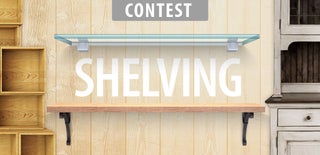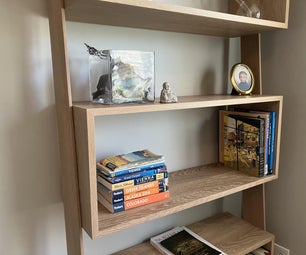Introduction: Folding Shelf Desk
As I've mentioned before in previous instructables, I live in a teeny tiny apartment. At the time of this project build, my boyfriend had just moved in with me and we were craving a little extra desk space from time to time. I only had 1 spare corner left in the room, and it wasn't quite deep enough for a full on secretary desk with cabinet. I needed something slimmer, and ideally something that could be mounted on the wall so there wouldn't be any table legs in the way to add to the feeling of clutter and claustrophobia. I looked at a number of desks (here are two web pages showcasing all the different folding desks available out there: http://www.tinyassapartment.com/2012/03/above-fold... and http://www.decoist.com/fold-down-desks/) but none of them really fit the bill. I also had mounted my TV to the wall above the space, so any desk that folded upwards was out of the question. I also wanted a desk that would be sturdier than just a platform braced by a 45-degree chain or hinge.
This desk is 24" wide, but the tapering edges means that it feels a lot less claustrophobic than a regular fold down desk. On the back edge that is up against the wall, I have a 6" deep "shelf" that does not fold down and remains fixed. I found a lamp with a slim footprint to place there, and it has also become a handy place to set up a charging station. The desk is mounted with wall brackets so as not to crowd floor space and leg room. There's plenty enough space to store away a large laptop on the bottom "shelf" when closed. And there's even enough room leftover in the corner to fit a small fishtank! (one of my pet hobbies, literally, haha).
Step 1: Materials
Wood (furniture grade)
2 qty - 24" length of 1 x 6 poplar
2 qty - 14" length of 1 x 6 poplar
2 qty - 24" length of 1 x 8 poplar
*Keep in mind that exact dimensions are as follows: 1x6 = 0.75" x 5.25", 1x8 = 0.75" x 7.25"
**Therefore, always measure twice, adjust your dimensions accordingly, and cut once
***The drawings represent ideal theoretical dimensions, not the actual ones as measured on real planks of wood
Hardware
2 qty - 4" x 1/2" narrow desk hinge in unfinished brass by White Chapel Hardware ($8.95 each)
2 qty - L brackets for shelf wall mounting (about $1-2 each at the local hardware store)
16 qty - brass torex headed self driving screws (no pre-drilling required)
Mounting hardware for dryway (expanders, screws - weight bearing for up to ~150 lbs)
Tools
Ruler/measuring tape
1/2" chisel (I got the Narex 4 pc set but you really only need the 1/2" one)
Mallet
Japanese hand saw (Love, love, love!)
Clamps
Wood glue
Paintbrush
Varnish
Sandpaper
Step 2: Making the Angled Cut
How steep you want to make the cut is up to you. Just remember to leave enough of an edge that it will provide support to the top surface when closed. I decided on a stopping point about 5.25" in from the front edge. That leaves 2" of wood to support the top.
The most important thing is that for everything to lie flat and smooth, the hinge has to be at the exact vertical midpoint. Regrettably I have no pictures of me doing this on the actual project, so please refer to the drawing. Whether you use a handsaw or a electric saw, some wood will invariably be removed and "lost" as sawdust. When you put the two pieces back together again, you will notice that if you match one of the sides, the other side will no longer be contiguous. Therefore, when you measure and do your cut, choose a point slightly BELOW the midpoint to use as one of the ends of the lines (about 1/8" below). Make the angled cut. Then line up the pieces so the top is one flat line. The bottom piece will stick out towards the front side of the desk. Trim it to fit. You will then have pieces of wood that will meet seamlessly both when folded up and folded down.
Step 3: Gluing and Screwing
Take one 24” length of 1x6 and one of the 1x8 pieces and glue them together along the 1” edge to create the bottom surface of the desk. Apply clamps to keep them together.
At the same time, place one of the 14” lengths of 1x6 on either side of the clamped pieces of wood to create a butt joint. Make sure the edge with the angled cut is facing away. Glue the joints for reinforcement, and use 2 screws per side per plank to attach the bottom pieces to the side pieces.
Attach the top 24” length of 1x6 across the two side pieces and glue and screw in the same manner. This is going to be the immobile “shelf” that remains fixed and does not open with the rest of the top.
Take the small triangular piece that is going to be the sides of the folding part and attach them to the top 1x8 piece with glue and screws. Make sure the right angle lines up with the underside of the front edge.
Step 4: Chiseling and Installing Hinges
I had never chiseled anything before so I learned by trial and error. I watched a lot of videos on YouTube and read how-tos, but my first attempts were still kinda rough looking. Perfectly serviceable tho!
The hinges were about 3/16" thick on either side, so the goal was to hollow out a groove that fit the hinge perfectly when flat, taking care not to damage and break through the thin sides. The wood itself was only about 3/4" thick, and the hinge was 1/2" thick, so I had barely 1/8" leeway on a side!
I decided not to screw in the topmost screws on the bottom half of the hinge, since the piece underneath was kinda shallow at that angle by that point. I didn't want any screws poking through the desk! Plus, 5 screws per side seemed pretty sturdy already.
Step 5: Finishing
I decided to just use clear varnish since I liked the look and grain of the poplar. You can obviously use whatever you want on yours. Use painter's tape to protect the hinges or remove them prior to varnishing. Don't varnish the edges too much and create a thick layer otherwise you may risk them not meeting smoothly together when folding down the desk.
Step 6: Mounting
I mounted the L brackets first to the desk, then to the wall. I prefer it this way because I find drilling on the wall easier than drilling upside down. Obviously you'll have to have someone hold the desk steady for you.
I used wall expanders and screws with weight bearing capability up to 150 lbs. I don't really expect to use this desk nearly that heavy, but you never know!

Runner Up in the
Shelving Contest 2016

Participated in the
Tables and Desks Contest 2016













